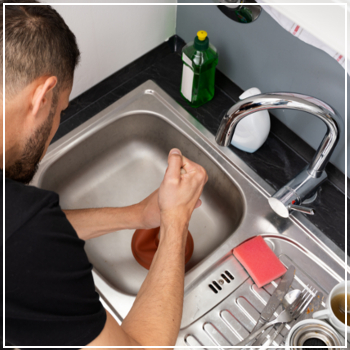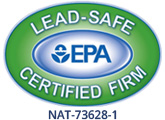How to Prevent Clogged Drains
 Clogged drains are a common plumbing issue that affect all homes. While they might seem relatively minor compared to leaking or burst pipes, making your own pipe snake doesn’t always yield the results you want. If you choose to use a drain cleaner, the caustic substance could damage your pipes over time and impact indoor air quality.
Clogged drains are a common plumbing issue that affect all homes. While they might seem relatively minor compared to leaking or burst pipes, making your own pipe snake doesn’t always yield the results you want. If you choose to use a drain cleaner, the caustic substance could damage your pipes over time and impact indoor air quality.
Clogged drains can also be a precursor to a more concerning, pervasive plumbing problem like interior rot or corrosion. Learn how drain clogs happen and the steps you can take to reduce their occurrence.
How Drains Become Clogged
Most of the time, items that pass through a sink drain are responsible for clogs. Common habits include throwing all food into the garbage disposal and rinsing grease, fat and oil into the sink, where they flow down the drain and eventually harden. Considering this:
- Be mindful of what goes down the drain. Throw coffee grounds, egg shells, fruit pits and fats into the garbage or compost.
- Add a screen or cover over the drain. This can capture debris as you wash dishes, reducing the amount that could accumulate inside and eventually clog your pipes.
- Avoid hot water while using the disposal. Cold water helps the garbage disposal move more efficiently than hot. On the other hand, not using any water could damage the garbage disposal.
Don’t Forget About the Bathroom
Clogged sinks are often associated with the kitchen but bathrooms can also experience this issue. Within these rooms of your home:
- Use a screen or hair catcher over the drain. These capture any loose strands of hair and soap residue to be disposed of in the trash.
- Lessen the amount of hair that could go down the drain. Brush your hair ahead of time or use a shower cap.
- Take care with bathing pets. If possible, avoid the tub. If you have to use it, place a washcloth over the drain to prevent hair you shed from passing through.
- Pay attention to what goes down the toilet. Only flush toilet paper. Sanitary napkins, wet wipes, feminine hygiene products, toys and dental products should not be flushed, as they won’t break down.
Routine Maintenance
Drains don’t clean themselves! Regularly perform the following maintenance tasks in the kitchen and bathrooms:
- Clean the strainer or grate over the drain. Forgetting can lessen its effectiveness at catching and filtering out debris.
- Run hot water down the drain after each major use to help move particles that could quickly harden. For instance, after washing dishes or taking a bath.
- Use a more natural drain cleaner to break up any residue. Baking soda with a cup of vinegar is one option. A bacteria-based drain cleaner, designed to eat away at any accumulation, is another. However, results won’t be instant if you’re dealing with a clog.
- As you clean the house, scrub each drain. Take off the screen and physically remove any debris. With the bathtub, also clean debris from the assembly.
If You Have a Clogged Drain
Before calling the professionals at MJ Fahy & Sons, you have a couple options to help break up a clog:
- Plunge the drain, which moves water in the pipes. You may need to run the water ahead of time.
- Create a plumbing snake to grab any hair and other debris that you cannot manually remove.
- Clean the screen and stopper, so no other debris falls down.
- If you have the tools, loosen the trap under the sink to remove any debris in your plumbing system.
If these steps don’t make a significant difference, the plumbing problem may require professional assistance. Potential scenarios include:
- A rotting or corroded section of pipe
- Collapsed pipe
- A blockage close to the sewer line
- Roots growing in the plumbing
To make an appointment with our team to examine your home’s plumbing, contact us today.




